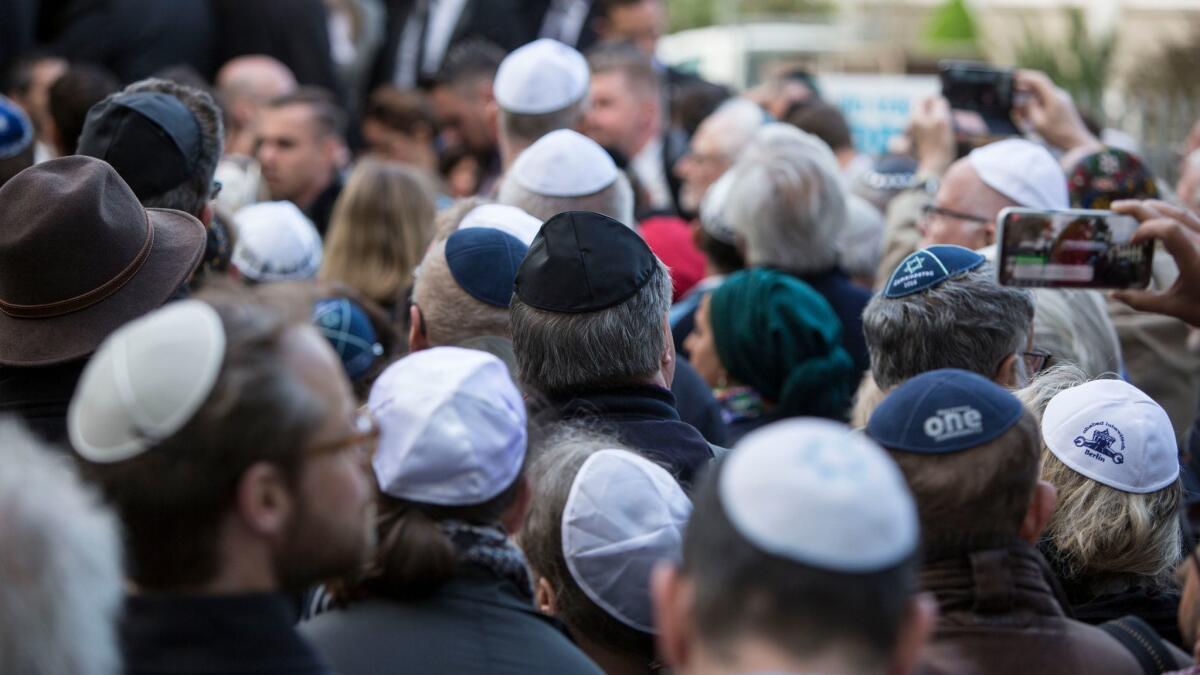Germans march against anti-Semitism after Berlin attack on Israeli wearing a yarmulke

Reporting from Berlin — Thousands of Germans participated in spirited rallies Wednesday to show their support for the country’s Jewish community and protest against an ominous wave of anti-Semitism.
Many protesters wore yarmulkes, or skullcaps, to show their solidarity with the estimated 200,000 Jewish people in Germany.
The protests came in response to anti-Semitic attacks in Berlin and elsewhere that united demonstrators from an eclectic variety of church groups, labor unions, political parties, academic, pro-Israeli groups and other community associations with Jewish community leaders in Berlin, Cologne, Erfurt, Magdeburg and Potsdam.
“We’re fed up,” Josef Schuster, president of the Central Council of Jews in Germany, told a crowd of about 2,500 at the largest rally in Berlin.
Schuster thanked the many non-Jews who wore yarmulkes at the rallies.
“We’ve become too complacent in Germany by starting to accept a bit of anti-Semitism, a bit of racism and a bit of anti-Islamic sentiment,” he said. “Some might ask: ‘What’s wrong with that?’ Everything’s wrong with that.”
In an incident last week that helped launch the protests, an Israeli man wearing a yarmulke was assaulted in Berlin by a suspect authorities described as a 19-year-old Syrian man seeking asylum. The suspect allegedly beat the man with a belt and shouted, “Yehudi” — the Arabic word for Jew.
The man who was attacked and another man wearing a yarmulke were first insulted by a group of three men and then whipped by one of the assailants, authorities said.
Video of the brief attack was posted on the internet. It sparked a round of soul-searching across Germany, raising concerns about whether the country’s sensitivity about its responsibility for the Holocaust more than 70 years ago, when 6 million European Jews were killed under Nazi rule, has waned.
The suspect later turned himself in to police. The victim, Adam Armoush, 21, told German television that he is a non-Jewish Israeli citizen from Haifa and was wearing the yarmulke to demonstrate to a friend that Berlin was not anti-Semitic.
Chancellor Angela Merkel condemned the attack. “We have refugees now, or people of Arab origin, who bring a different type of anti-Semitism into the country,” she said in a recent TV interview.
Berlin Mayor Michael Mueller, who was among those wearing a yarmulke, said at the rally that there is no room for anti-Semitism. About 25,000 Jews live in the city of about 3.5 million.
“I’ve always considered it to be a wonderful gift for us that so many Jews are living in Berlin again,” he said. “We won’t tolerate hate. Attacks against Jews are attacks against us all.”
Community leaders said they were inundated with calls of support from non-Jews in recent weeks, with many eager to show their solidarity, which led to the decision to stage the “Berlin wears yarmulke” demonstration on a closed-off street in front of the Jewish community center in the heart of west Berlin.
There were about 500,000 Jews in Germany when the Nazis took power in 1933. That was reduced to about 30,000 by the Holocaust. The population has grown to 200,000 in recent years, mainly a result of immigration from the former Soviet Union and Israel.
“It feels good to see so many of you here today with skullcaps,” said Gideon Joffe, the leader of the Berlin Jewish community, at the start of the rally. “It’s an important sign to see so many Berliners out on the street to show there’s no room for anti-Semitism in Berlin.”
Schuster defended his recent comments urging young Jews in Berlin to avoid wearing yarmulkes while out on their own because of the perils in a city where hundreds of thousands of refugees and immigrants from the Middle East have arrived in recent years.
“A majority of Germans think there’s no anti-Semitism,” Schuster said. “But the reality in Germany is that parents urge their sons to cover their skullcaps with baseball caps and tell their daughters to hide their Star of David under their sweaters when they’re in the subway. It’s happening right in our midst. We can’t let this go on like this. Enough is enough.”
A German organization that tracks discrimination against Jews said there were 947 acts of anti-Semitism reported in 2017, including 18 attacks and 23 threats. Jewish students have reported an increasing number of cases of anti-Semitic bullying in schoolyards in recent months.
One of the country’s most popular rap groups, Kollegah and Farid Bang, won the prestigious Echo award two weeks ago after selling 200,000 copies of an album that included lyrics some observers called anti-Semitic and distasteful. Several other Echo winners returned their awards in protest, and the German music industry announced Wednesday it had decided to scrap the Echo award and ceremony.
“I think it’s horrible that anti-Semitism is on the rise in Germany, and we’ve got to stand up against that,” said Friedemann Hoeppner, a 39-year-old lawyer who was wearing a yarmulke at the rally to show solidarity. “The time has come to rise up against this. I think it’s great that so many people came out here today.”
Kirschbaum is a special correspondent.
More to Read
Sign up for Essential California
The most important California stories and recommendations in your inbox every morning.
You may occasionally receive promotional content from the Los Angeles Times.










